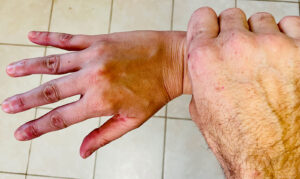California law protects victims of sexual harassment outside of work. Sexual harassment outside of work can happen in a number of different professional relationships, such as sexual harassment committed by a doctor, therapist, landlord, accountant, lawyer, or teacher.
Read more to find out about California laws that protect victims from sexual harassment outside of work.
In 1994, the California Legislature declared that, “sexual harassment occurs not only in the workplace, but in relationships between providers of professional services and their clients.” To address cases of sexual harassment in business and professional relationships, the Legislature added California Civil Code Section 51.9, which created a cause of action for sexual harassment that occurs as a part of a business or professional relationship.
In 2019, the law was updated to specifically add legal protection against sexual harassment committed by elected officials, lobbyists, directors, and producers.
To succeed on a claim under this section addressing sexual harassment in business and professional relationships, a plaintiff must prove several elements. First, there must be a business, service, or professional relationship between the plaintiff and defendant. California law specifically protects individuals from sexual harassment by physicians; psychotherapists; dentists; attorneys; social workers; real estate agents and appraisers; accountants; bankers; trust officers; financial planner loan officers; collection service professionals; building contractors; escrow loan officers; executors, trustees and administrators of estates; landlords and property managers; teachers; elected officials; lobbyists; and directors or producers. Anyone in a relationship that is substantially similar to the professional relationships listed above can also be held liable under California Civil Code section 51.9.
The plaintiff must also prove that he or she was sexually harassed. Under section 51.9, sexual harassment occurs when the defendant has made unwelcome and pervasive or severe sexual advances, solicitations, sexual requests, or demands for sexual compliance by the plaintiff. Furthermore, a defendant commits sexual harassment by engaging in verbal, visual or physical conduct of a sexual nature or of a hostile nature based on gender, that is unwelcome and pervasive or severe.
In addition, the plaintiff must show that they have suffered or will suffer economic loss or disadvantage or personal injury. Economic loss includes emotional distress or the violation of a statutory or constitutional right caused by defendant’s actions.
The section 51.9 protection against sexual harassment in business, service and professional relationships is a significant expansion of the protection against sexual harassment in Federal Title VII and the California Fair Employment & Housing Act. The California Supreme Court has confirmed that the legal analysis for determining whether a defendant’s conduct is sufficient to constitute sexual harassment is substantially the same for sexual harassment in professional and business relationships as it is for sexual harassment in the workplace.
At Broderick Law, an experienced sexual harassment attorney can answer your questions about sexual harassment outside of work, and guide you on what your options are moving forward. If you have been sexually harassed outside of work by a professional, such as a teacher, doctor, therapist, counselor, landlord, broker, accountant, lawyer, or financial advisor, talk to an attorney to get advice on what you should do to protect yourself and pursue your rights. Contact our office in Palo Alto, California today to speak with sexual harassment lawyer Timothy Broderick at (650) 857-9000. Our attorneys are here to protect and fight for sexual harassment victims across Northern California.




